Postpartum Depression: Understanding and Overcoming
Becoming a parent is often heralded as one of life’s most joyous and fulfilling experiences. However, it’s crucial to recognize that this journey is accompanied by a range of emotions, including those that are not always positive. Postpartum depression (PPD) is a complex and often misunderstood condition that can affect individuals after childbirth. In this comprehensive guide, we delve into the depths of postpartum depression, exploring its causes, symptoms, effects, and most importantly, the strategies to overcome it.
Defining Postpartum Depression:
Postpartum depression is a mental health condition that occurs after childbirth, affecting individuals regardless of their background, age, or experience. It goes beyond the commonly experienced “baby blues” and often manifests as prolonged feelings of sadness, anxiety, and hopelessness. PPD can make the transition into parenthood challenging and can also affect the emotional bonding between the parent and the baby.
Understanding the Causes:

The exact cause of postpartum depression is complex and multifaceted, involving a combination of biological, hormonal, psychological, and environmental factors. Hormonal changes, sleep deprivation, history of depression, lack of a support system, and adjusting to the new responsibilities of parenthood are all potential contributors to the development of PPD. Understanding these causes is the first step in addressing and managing the condition.
Recognizing the Symptoms:
Recognizing the symptoms of postpartum depression is essential for early intervention. While symptoms can vary from person to person, common signs include persistent feelings of sadness or emptiness, extreme irritability, changes in appetite and sleep patterns, difficulty concentrating, loss of interest in activities, and thoughts of harming oneself or the baby. It’s crucial to remember that seeking help is a sign of strength, not weakness.
Effects on the Parent and Baby:

Postpartum depression doesn’t just affect the parent; its effects can ripple through the entire family unit. The emotional connection between the parent and the baby may be compromised, leading to challenges in bonding. Additionally, PPD can impact the parent’s ability to care for themselves and their newborn, potentially affecting the baby’s overall well-being.
Seeking Help: The First Step Towards Healing:
It’s important to emphasize that postpartum depression is treatable, and seeking help is paramount. If you or someone you know is experiencing symptoms of PPD, reaching out to a healthcare professional is a crucial step. Mental health providers, therapists, and counselors can provide support, therapy, and guidance tailored to the individual’s needs.
Treatment Options: From Therapy to Medication:
The treatment approach for postpartum depression varies based on the severity of the condition. Therapy, particularly cognitive-behavioral therapy (CBT), has proven effective in helping individuals cope with the challenges posed by PPD. For cases that require additional support, medication under the supervision of a healthcare provider may also be recommended. It’s important to have an open and honest discussion with a medical professional to determine the best course of action.
Self-Care and Support: Building Resilience:
In addition to seeking professional help, practicing self-care and building a strong support system are integral to overcoming postpartum depression. Adequate rest, proper nutrition, physical activity, and engaging in activities that bring joy can contribute to overall well-being. Support from partners, family members, friends, and support groups can provide comfort, encouragement, and a sense of community during this challenging time.
The Road to Recovery: A Journey of Resilience:
Recovering from postpartum depression is a journey that requires time, patience, and resilience. It’s important to remember that progress may not be linear, and setbacks are a natural part of the healing process. As individuals learn to manage their symptoms and cultivate a sense of self-compassion, they pave the way for a brighter and healthier future for themselves and their families.
Conclusion: Shedding Light on the Shadows:
Postpartum depression casts a shadow over the joyful moments of parenthood, but it’s a shadow that can be lifted with the right resources and support. Understanding the complexities of PPD, recognizing the symptoms, seeking help, and embracing treatment options are crucial steps in navigating this challenging journey. With the right strategies and a strong support system, individuals affected by postpartum depression can reclaim their well-being, rebuild emotional connections, and embrace the transformative experience of parenthood with newfound strength and resilience.




